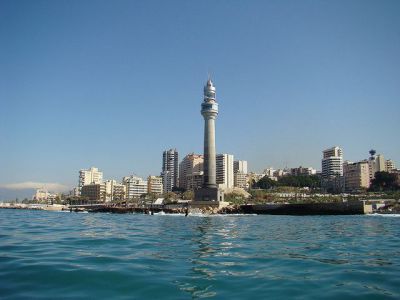New Lighthouse Al Manara, Beirut
The words "Al Manara" in Arabic mean, "the Lighthouse." Beirut has had five different lighthouses since the 19th century. By the early 1800s Beirut had become a vital maritime nexus between east and west. To guide ships safely, the lighthouses were erected in succession at the tip of land called Ras-Beirut.
All five lighthouses have been operated by the Chablis family. The first lighthouse was a brick tower, a little less than fifty feet high and it burned kerosene. The second light, built in the 1920s, was on a little higher ground than the first. It was concrete, measuring 66 feet in height. In 1990 it was renovated by order of President Hrawe.
The third lighthouse was also built in Ras-Beirut. It's construction followed the loss of the French ship Champollion in 1952. The ship's navigator confused the lighthouse with the lights of the airport while trying for the harbor. The second lighthouse was replaced.
The third lighthouse and the fourth lighthouse were darkened by war and by subsequent shoreside constructions after the war that obscured them from the sea. In 2003 Beirut's fifth lighthouse was built. It is situated well away from built-up areas at the edge of the waterfront. It is 118 feet high, its light flashes white two times, every ten seconds.
All five lighthouses have been operated by the Chablis family. The first lighthouse was a brick tower, a little less than fifty feet high and it burned kerosene. The second light, built in the 1920s, was on a little higher ground than the first. It was concrete, measuring 66 feet in height. In 1990 it was renovated by order of President Hrawe.
The third lighthouse was also built in Ras-Beirut. It's construction followed the loss of the French ship Champollion in 1952. The ship's navigator confused the lighthouse with the lights of the airport while trying for the harbor. The second lighthouse was replaced.
The third lighthouse and the fourth lighthouse were darkened by war and by subsequent shoreside constructions after the war that obscured them from the sea. In 2003 Beirut's fifth lighthouse was built. It is situated well away from built-up areas at the edge of the waterfront. It is 118 feet high, its light flashes white two times, every ten seconds.
Want to visit this sight? Check out these Self-Guided Walking Tours in Beirut. Alternatively, you can download the mobile app "GPSmyCity: Walks in 1K+ Cities" from Apple App Store or Google Play Store. The app turns your mobile device to a personal tour guide and it works offline, so no data plan is needed when traveling abroad.
New Lighthouse Al Manara on Map
Sight Name: New Lighthouse Al Manara
Sight Location: Beirut, Lebanon (See walking tours in Beirut)
Sight Type: Attraction/Landmark
Guide(s) Containing This Sight:
Sight Location: Beirut, Lebanon (See walking tours in Beirut)
Sight Type: Attraction/Landmark
Guide(s) Containing This Sight:
Walking Tours in Beirut, Lebanon
Create Your Own Walk in Beirut
Creating your own self-guided walk in Beirut is easy and fun. Choose the city attractions that you want to see and a walk route map will be created just for you. You can even set your hotel as the start point of the walk.
Seaside Walking Tour
If you wish to unwind or, perhaps, seek some quality time with your family and friends in a completely safe environment, while in Beirut, the local seaside area offers ample opportunities for both. Lined with palm trees, the city's waterfront guarantees a truly joyful experience and is as much fun for watching the Mediterranean, beautiful people and breathing the air as it is for exploring... view more
Tour Duration: 2 Hour(s)
Travel Distance: 3.2 Km or 2 Miles
Tour Duration: 2 Hour(s)
Travel Distance: 3.2 Km or 2 Miles
Beirut Introduction Walking Tour
How many times can a city die? Beirut, in 5,000 years, has died and come back many times. Archeological digs downtown have revealed Phoenician, Greek, Roman, Byzantine, Arab, Crusader and Ottoman remains and signs of influence.
In 140 BC the city was destroyed by Diodotus Tryphon, a king of the Seleucid Empire. His Hellenistic city lies over the Phoenician one. Pompey the Great arrived in 64 BC... view more
Tour Duration: 2 Hour(s)
Travel Distance: 3.3 Km or 2.1 Miles
In 140 BC the city was destroyed by Diodotus Tryphon, a king of the Seleucid Empire. His Hellenistic city lies over the Phoenician one. Pompey the Great arrived in 64 BC... view more
Tour Duration: 2 Hour(s)
Travel Distance: 3.3 Km or 2.1 Miles





